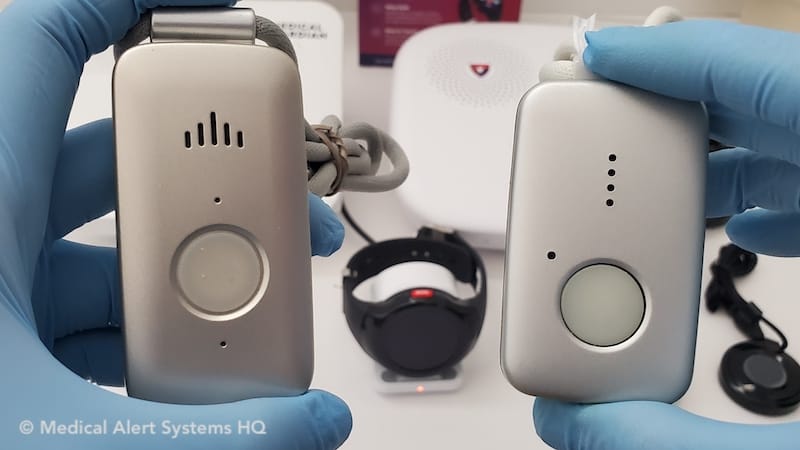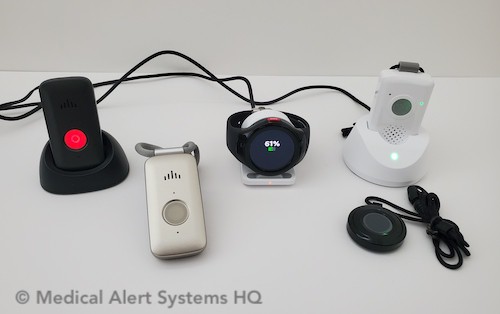Reviews & Comparisons To Help You Find The Best System
This site earns fees from qualifying purchases and referrals (learn more).

Welcome to the Medical Alert Systems HQ site, where you will find reviews of the best medical alert systems. Our site provides informative, data-driven medical alert systems reviews to empower you to quickly compare and find the best medical alert systems for your or your parent’s needs.
We’ve carefully tested many medical alert products hands-on in order to share real-life product usage experiences and performance data you won’t find elsewhere (example). Medical alert devices allow seniors and other product users to quickly call for help at the push of a button. Skip to see top recommended list of products.
In the quick video below, we demonstrate how a medical alert button works. You can see an example of how the call process unfolds.
Check out our list of the Top Recommended list, and what stands out about each product.
In a hurry? Leave us your email, we’ll follow-up with the best tips.
Check out our detailed Medical Alert Systems Reviews of the top companies and use the Compare Medical Alert Systems chart provided for a quick side-by-side review of these systems. You can read more about how we review and rate here.
Too much information? Skip to see the Top Recommended list.
All About Medical Alert Systems
Why Medical Alert Systems?
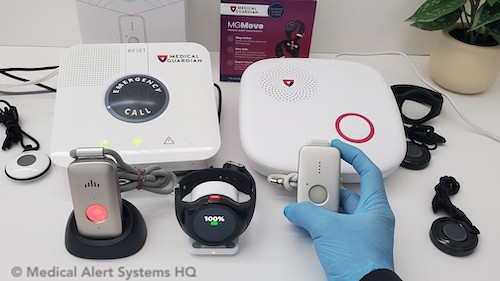
Medical alert systems enable seniors, individuals with health challenges and others to live (or work) independently on their own, knowing that help is a button-press away. These systems provide a convenient way to reach out for help during medical emergencies and unforeseen events.
For seniors, the risk of falls often raises concern. According to the Center for Disease Control (CDC), one in three seniors above the age of 65 falls down each year, and 20% to 30% of them become injured to the extent that it hampers their future ability to get around. Once a senior has fallen, it is imperative that they have access to help as quickly as possible. The fast assistance limits their condition from deteriorating further.
Medical alert systems provide a lifeline to help when needed. They allow subscribers to continue living on their own independently. Perhaps an elderly customer has fallen and can’t get up on their own, or they find themselves feeling severely nauseous and need medical attention right away. This ready access to help could delay the move into nursing homes or long term care facilities.
Furthermore, with awareness of social distancing rising post-Covid, medical alert systems are more relevant than ever. Medical alert subscribers know that should any emergencies happen when they are alone, they can easily push their button. A trained support person is ready to address the situation and send help if needed.
How Do Medical Alert Systems Work?
Medical alert systems are devices that offer customers the ability to quickly call for help in emergencies by pressing a help button. Customers can connect with a live trained monitoring professional anytime 24/7 by pressing on their help button.
The button push will initiate an emergency phone call through a base unit or mobile device. A trained monitoring professional will answer their call. You can see the button push and call process in action in our videos below.
There are traditional in-home medical alert systems and newer mobile alert systems with GPS.
In-Home Medical Alert Systems
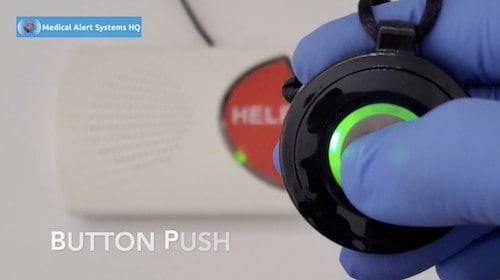
What makes this system stand out?
In-home medical alert systems consist of 3 main parts:
Base Console Unit
For traditional in-home systems, the base console unit is the part that connects to a phone line and a speaker, microphone and programming to keep the system running. It is about the size of a desktop phone.
Landline vs Cellular
The medical alert base unit works when connected to a power source and a phone line. If your home does not have a landline subscription, you can opt for a cellular base console unit that will connect through a cellular network like AT&T or Verizon wireless. These “no landline needed” units come with a SIM card pre-installed and cellular service included.
There are also newer mobile medical alert systems that are not tethered to a home address. They operate both in and out of the home. We will cover these further along this guide.
Help Button
Also referred to as the emergency SOS button or panic button, this button is depressed to activate an alarm call from base console unit wirelessly. It is usually worn as a necklace pendant or as a bracelet wristband.
Some help buttons have sensors in them to detect falls. When the sensing mechanism detects a fall, the medical alert system will automatically initiate an alarm call without a button push.
Monitoring Help Center
The medical alert system emergency calls are routed to a 24/7 call monitoring center. The center’s trained monitoring professionals will answer the calls and help their customers. They will speak with the customer to assess the situation and then call the customer’s emergency contacts (eg. their son, daughter or caregiver) or dispatch an ambulance as needed.
There are also non-monitored medical alert systems where seniors can connect to 911 directly instead of calling a private monitoring service.
Mobile GPS Medical Alert Systems
Mobile GPS medical alert systems are based on one-piece help button and speaker devices that work both in and out of the home.
Here are some examples mobile medical alert devices. Which ones appeals to you?
Mobile medical alert devices contain a help button to make emergency calls, a SIM card for cellular phone connections, and a speaker and microphone for two-way conversations. Most include GPS location tracking and optional fall detection. These devices work in a standalone manner. You do not need to have a smartphone or cell phone subscription. (Even if you have a smartphone, you cannot link it to your medical alert device.)
Over the years, we’ve purchased and tested numerous mobile medical alert devices. These products started gaining traction over a decade ago and have since grown into a mainstream medical alert product category.
The latest models are impressively lightweight and small in size despite having to include a speaker, microphone and function as an all-in-one base unit and help button. The frontrunners are the Freeus Bellex and new MG Mini devices. These are offered through several major medical alert brands (eg. LifeFone VIPx, Mini Guardian, Bay Alarm Medical SOS Mobile).
Smartwatches with SOS help buttons are another new frontier. They offer a convenient and stylish way for seniors to access SOS help. Some people are used to wearing a watch daily. If so, this accessory format will fit right in with their lifestyle. Others may be looking for a modern, updated accessory that avoids the stigma of wearing of “life alert” button.
Whatever the reasons, the popularity of these watches has risen. While skeptical at first, we were pleasantly surprised by how well these watches work. Major brands like LifeFone and Bay Alarm Medical offer super user-friendly smartwatches that work right out of the box. They do not need to be activated or paired with a smartphone.
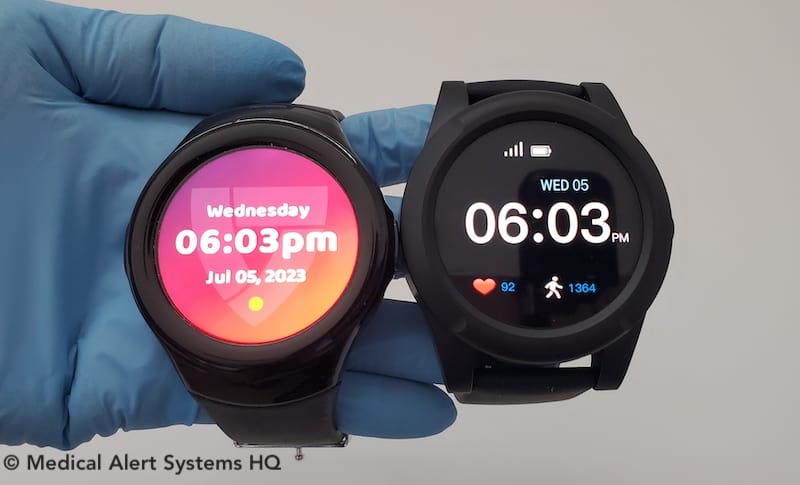
Based on our experience buying these packages, medical alert companies will typically provide a single small button pendant device, a charger, and a necklace lanyard for wearing it. A device case or belt clip may also be included, but that is not always the case.
In terms of pricing, some companies loaned us their medical alert equipment for free when we subscribed to their monthly plans. In those cases, when canceling, we had to send the device and accessories back.
Other companies wanted us to purchase their medical alert devices outright. Although it cost us more initially, that arrangement provided the advantage of not needing to mail the equipment back when canceling.
In the next section, you can watch videos on how mobile medical alert systems work through real-world live test calls we made.
The Best Medical Alert Systems In The Market Today
Based on our testing and product usage experience, these are the best medical alert systems we recommend. An ideal system should do well in all 3 areas: equipment, monitoring service, and pricing and administration (more info).
Disclosure: We earn referral fees for qualifying purchases and referrals (more info).
Mobile Medical Alert Systems
Mobile medical alert systems are recommended for people who want a device that works both at home and on-the-go. The button devices come with their own speaker and microphone.
LifeFone VIPx
Below is a product demonstration video of the LifeFone VIPx mobile medical alert. Watch what happens when we push the help button for a live test call.
Questions? Call toll-free 1-877-352-1292 or visit LifeFone’s Official Website
What stands out about it:
- Updated contemporary, lightweight appearance (1.3 oz, in Silver/ Champagne, White or Black)
- Up to 10 days of battery life advertised. We tested this out successfully (reaching 16 days). Outstanding performance when compared to the typical 3 to 5 days we’ve experienced with other devices.
- Test calls always professionally and quickly answered in clear English. We confirmed that their service is US-based and TMA (The Monitoring Association) Five Diamond certified.
- Accurate GPS location test results. Sharing of GPS information tested, worked as promised.
- Choice of Verizon or AT&T networks – we were given a choice of either at no extra cost.
- We received free Email and Text system alerts. These keep subscribers and caregivers posted.
- We were not charged any equipment fees when purchasing. When canceling, we were required to to mail the pendant back.
Medical Guardian’s Mini Guardian
Here is a video of a product test call we performed using the Mini Guardian device. Watch and see how quickly the operator connected in this real-world test. This is based on the same lightweight device as the LifeFone VIPx above, but customized for Medical Guardian. Watch both videos to see how the products compare.
Questions? Call toll-free 1-800-311-6142 or visit Medical Guardian’s website
What stands out about it:
- Very small and lightweight contemporary design (comes in Silver/ Champagne, White or Black). Product received was easy to understand and use.
- We experienced super-fast response times (average 19.8 seconds performance when tested).
- Our test calls were always answered quickly and professionally. Our usage experience revealed to us that the monitoring service employed is US-based, UL Listed and TMA Five Diamond certified.
- When purchasing, the subscription included Verizon’s wireless connection at no extra cost. This worked separately from my personal cell phone service plan.
- Our subscription purchase included access to the MyGuardian app free-of-charge.
- We purchased the Mini device and were not required to mail it back when canceling.
Medical Guardian’s MG Mini (2023)
Medical Guardian has a newer mobile medical alert device called the MG Mini, introduced in 2023. It is even smaller than the Mini Guardian (above). It is a proprietary product with features and technologies only available to Medical Guardian customers. Check out a video demo of the test call we did:
Questions? Call toll-free 1-800-311-6142 or visit Medical Guardian’s website
What stands out about it:
- Based on smallest medical alert device on the market today. Smaller than its predecessor, the Mini Guardian.
- 4 colors to suit different personalities – silver, black, cream, rose gold (limited edition)
- Alarm cancellation and automated clearing features to prevent false alarms (see video above)
- Intelligent voice assistance (Stella) that keeps subscribers informed about the device status – check battery level, connectivity strength and to make test calls without needing to set off an alarm
- Prompt, professional monitoring provided through US-based, UL Listed and TMA Five Diamond certified monitoring centers.
- Very comprehensive choice of features: fall detection, paired buttons to use while charging or sleeping, voice-activated wall buttons
- Free hourly location updates included in MyGuardian app. Helpful for family members to locate their loved ones. (Not available through the Mini Guardian.)
For more information, please call Medical Guardian at 1-800-311-6142. You can also Contact Us for more information. We will do our best to answer your questions based on our experiences comparing products.
In-Home Medical Alert Systems
In our in-home medical alert product testing, Bay Alarm Medical tested the best overall. They come with an in-home base station unit that contains the speaker and microphone, and a separate necklace or wrist button combo.
Bay Alarm Medical SOS Home Medical Alert
Here is a video demonstration of the Bay Alarm Medical alert system for in-home use. Watch what happens when we push on the medical alert button.
Questions? Call toll-free 1-855-397-9964 or visit Bay Alarm Medical’s website
What stands out about it:
- Very good equipment and certified monitoring
- Fast response time (21 seconds average for SOS Home (cellular), updated 2023 test results)
- Low prices. Landline ($24.95/mo) or Cellular ($29.95/mo) options
- Lanyard and wristband button combo provided (2 styles to choose from)
- Web dashboard for managing your account and checking system status (helpful for subscriber and family)
- Pricing and terms clearly provided, transparent company to work with
Read Bay Alarm Medical SOS Home review
Medical Alert Smartwatch (No Cell Phone or Internet Access Needed)
Bay Alarm Medical SOS Smartwatch
While a standard help button device has broad appeal, it is not an accessory that many of us are accustomed to wearing. An SOS smartwatch addresses this hurdle by fashioning an SOS help button into a common dress accessory. You can speak with the monitoring agent directly through the watch.
This smartwatch works in a standalone manner – no iPhone, Android phone, or cell phone plan needed. After unboxing the watch, we charged it up and successfully made our first test call. To demonstrate how the watch’s SOS button works, check out this video of a test button push:
Questions? Call toll-free 1-855-397-9964 or visit Bay Alarm Medical’s website
What stands out about it:
- Classy style works for both ladies and gentlemen.
- Works right out of the box. No smartphone, wifi, internet access, cell phone plan needed.
- Fast response time based on our testing (average response time 34 seconds, including 5 seconds of cancellation delay).
- Reasonable battery life. When tested, it worked smoothly with daily charging.
- Clear two-way communication through the watch itself.
- Water-resistant, can be used in showers. High IP67 rating.
Read Bay Alarm Medical SOS Smartwatch review
You can read reviews about these and other top-rated companies on our Medical Alert Systems Reviews section. For an overview on how senior alert companies compare, check out the Comparison Chart.
In a hurry? Leave us your email, we’ll follow-up with the best tips.
How Much Do Medical Alert Systems Cost?
Medical alert system subscriptions range from $25 to $50 depending on the type of system. An in-home medical alert system will typically costs between $25 and $45 per month and a mobile GPS alert system between $30 and $50 a month.
If all you need is a standard in-home system, you are looking at a cost of about $25 a month (see example). Sometimes, you may have a need to bundle in additional accessories or features. The cost of optional accessories like wall buttons or features like fall detection could bring the final monthly cost up to as much as $60, or even higher a month. See the chart below for a breakdown of the costs.
Elderly home medical alarm systems subscriptions typically include the base device’s rental, help button rental, and ongoing monitoring service. An example can be found in this detailed review here.
| Medical Alert Systems/ Products | Price Range |
|---|---|
| In-Home (Landline) | $20 to $30/ month |
| In-Home (Cellular) | $20 to $45/ month |
| Mobile GPS | $30 to $55/ month; $50 to $150 one-time for device purchase if needed |
| Activation & Installation Fees | $0 to $70 |
| Optional Fall Detection | $5 to $15/ month |
| Optional Protection Plan | $5 to $7/ month |
| Optional Add-ons (Location sharing, Text notifications, Extra buttons, Wall buttons, Lockbox etc) | $3 to $10/ month |
Price Range Notes: The above are estimated price ranges for your general reference. The exact pricing will vary from company to company. Regarding accessories like extra buttons, companies may charge a one-time upfront fee instead of a monthly fee.
As for discounts, some companies offer extra months of service by paying for a year upfront. Others will provide an already discounted standard monthly rate, whether you are paying monthly or annually. It pays to shop around and compare before purchasing. For the best pricing, consider calling into the companies for unadvertised specials.
For readers who are price-conscious, take a look at Bay Alarm Medical’s prices and terms. They compare well with other companies and could serve as a benchmark.
Where To Buy Medical Alert Systems
Most medical alert systems can be directly purchased by calling the companies’ toll-free numbers or visiting their respective websites online. The medical alert package is then shipped to customers. Alternatively, some healthcare organizations or doctors may also refer you to brands they are partnered up with.
More and more medical alert companies are choosing to publish detailed information about their products and policies on their official websites. This makes it easy for shoppers to research and compare systems without having to brave through numerous sales pitches.
Medical Alert System Accessories and Extras
We have covered what medical alert systems are and some of the best companies and their systems. Besides the main systems, there are supplemental medical alert features and accessories that could provide additional convenience and safety. Here is guidance on these extras.
Automatic Fall Detection
The majority of medical alert systems can be upgraded to include automatic fall detection. One of the leading causes of injury to the elderly is falling. If the subscriber falls and loses consciousness or the capacity to push their buttons, automatic fall detection comes into play.
The technology currently isn’t completely failsafe and can give false alerts or miss out on correctly detecting real falls. But despite the potential for false or missed alarms, and the added cost, this feature still offers extra protection and could save a loved one’s life. Typically, it will cost around $10 a month extra for this service.
Wall Buttons
Another medical alert extra that is worth exploring is wall buttons. They are easy to install (you just stick them to a wall) and are relatively inexpensive.
Why wall buttons? Sometimes, system subscribers could forget to wear their medical alert buttons. With wall buttons installed around the home, there are additional lifelines to activate the alert system for help during emergencies.
Wall buttons can be mounted in areas where the subscriber faces greater risk, such as in the bathroom or on the stairs. These buttons are usually in the ballpark of around $3 to $5 a month or purchased outright for a one-time cost (around $30 to $50).
Key Lockboxes
It can be very beneficial to install a safety lockbox to store a key to the subscriber’s home either on the front or side door. You should let your medical alert system provider know the location and code to the lockbox.
If emergency services are summoned to the customer’s home, they will aim to gain entry to the caller’s property as quickly as possible to deal with the situation. This could include breaking down doors.
If you have a lockbox with an extra key inside, it could save the costs and hassle of having a door repaired. At the same time, it allows first responders to deal with the emergency quickly.
Key lockboxes cost about $3 to $5 a month to rent, or can be purchased outright for around $30 to $40.
Mobile Apps and Text Alerts
Some companies offer companion caregiver alerts and medical alert apps as additional supplement benefits for their medical alert subscribers. For example, some companies offer email and text notifications to the subscriber’s caregivers or loved ones whenever the button has been pressed or when the battery level of the medical alert system is low.
This allows family members to stay connected with the well-being of their loved ones and how well they are using their medical alert system. Based on our product purchase and usage experience, we received free email and text notification alerts as customers of Bay Alarm Medical and LifeFone. We found these automated alerts very handy. They kept us updated about the status of our medical alert products.
Yet other medical alert companies offer companion emergency button mobile apps that customers can add to their cell phones. This is a mobile alert app on the cell phone that could feature a red SOS help button.
The mobile app is not meant to replace a medical alert system’s necklace or wrist help pendant. It is an additional avenue for customers to get help during emergencies, especially outside of their homes. Most companies do not offer this, but you can find it with LifeFone. They provide a mobile app option for customers to connect with LifeFone’s reliable monitoring services.
Protection Plan
A protection plan is another add-on service for a medical alert system. With a protection plan in place, if something goes wrong with the equipment, the company will either repair it for you or send out replacements (within plan limitations).
Besides offering peace of mind that you will always have access to working equipment, the protection plan could shield you against damaged equipment fees when you want to cancel.
Most companies will charge a “damaged or lost equipment fee” during the cancellation process if the equipment returned is damaged or reported lost. In case of spills, power surges, excess heat and other sorts of unexpected damage, your equipment is covered.
Next Steps – Review and Compare
Having a medical alert system enables the elderly and others to receive help should emergencies occur. There are a number of medical alert systems and companies out there to choose from. Through this guide and the rest of our reviews, we want to make it easy for you to compare and find the best system for your or your parent’s needs.
Looking for a medical alert system? Start by checking out our Best Medical Alert Systems Reviews section.
Please Tell Us What You Think About This Site, Thank You!
In a hurry? Leave us your email, we’ll follow-up with the best tips.

